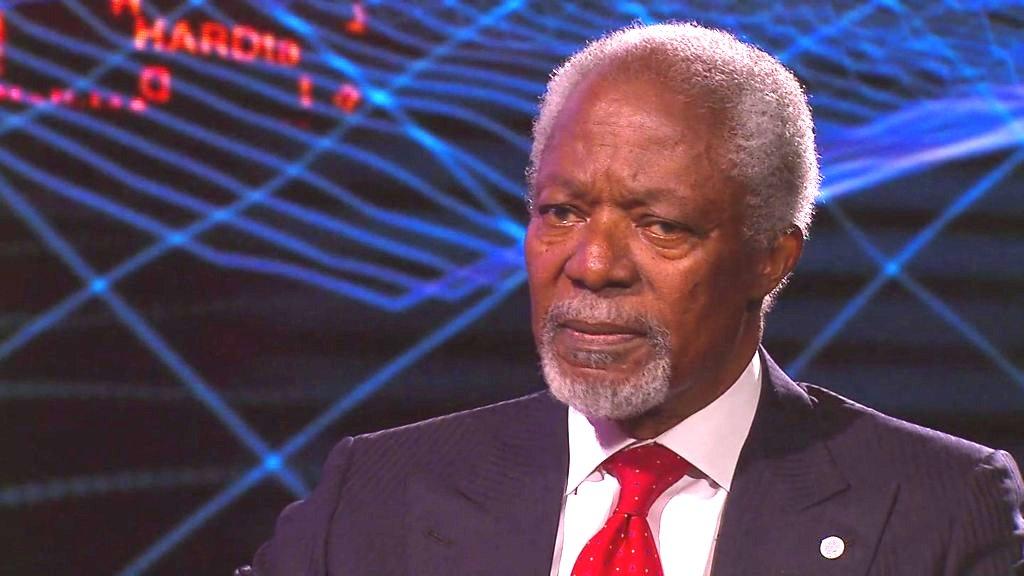Kofi Annan death: World leaders honour former UN chief
- Published
Kofi Annan accepts his Nobel Peace Prize
World figures have been paying tribute to former UN secretary-general and Nobel laureate Kofi Annan, who has died at the age of 80.
Current UN chief Antonio Guterres hailed him as "a guiding force for good" and Russian President Vladimir Putin described a "remarkable person".
Ex-US President Barack Obama said Annan had always pursued "a better world".
The Ghanaian national served as UN chief from 1997 to 2006 and is the only black African ever to hold the post.
Since then he has served as the UN special envoy for Syria, leading efforts to find a solution to the conflict.
The career diplomat died in hospital in the Swiss city of Bern. He had been living near Geneva for several years.
He "passed away peacefully on Saturday after a short illness, external", the Kofi Annan Foundation said.
He was a "deeply committed internationalist who fought throughout his life for a fairer and more peaceful world", the statement added.
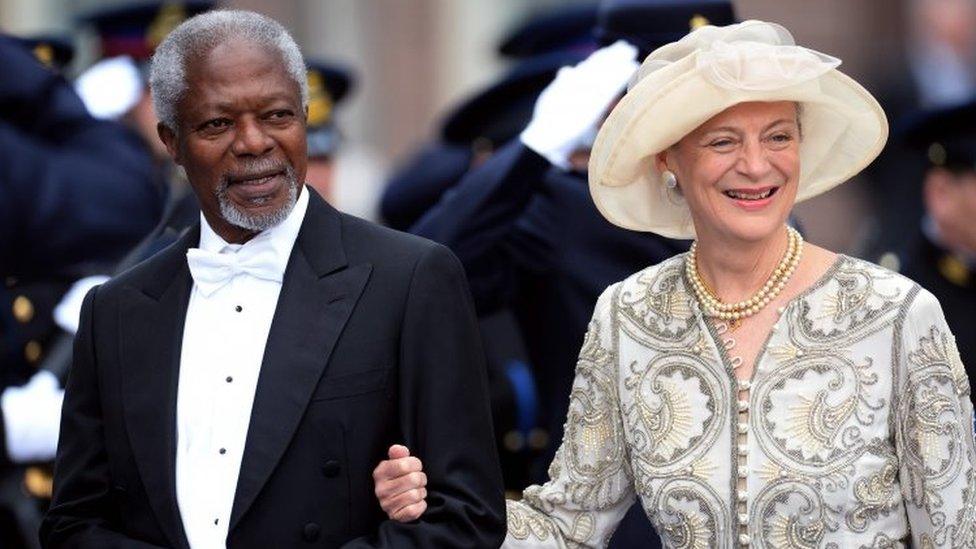
Kofi Annan's wife, Nane, was by his side when he died
Mr Guterres led the tributes to his predecessor. "In many ways, Kofi Annan was the United Nations. He rose through the ranks to lead the organisation into the new millennium with matchless dignity and determination," he said in a statement.
UN high commissioner for human rights Zeid Ra'ad Al Hussein said in a tweet he was grief-stricken over Annan's death:
Allow X content?
This article contains content provided by X. We ask for your permission before anything is loaded, as they may be using cookies and other technologies. You may want to read X’s cookie policy, external and privacy policy, external before accepting. To view this content choose ‘accept and continue’.

Mr Obama, the first African American to win the White House, said: "Long after he had broken barriers, Kofi never stopped his pursuit of a better world."
President Putin said the memory of Annan would "forever live in the hearts of Russians".
Meanwhile, Indian PM Narendra Modi said "the world has lost not only a great African diplomat and humanitarian but also a conscience keeper of international peace and security".

Remembering Kofi Annan
By Imogen Foulkes, BBC's UN reporter in Geneva
Kofi Annan will be remembered for the way he drew attention, over and over again, to the plight of those caught up in war, environmental disaster, or simply grinding poverty.
The way he quietly but firmly reminded world leaders, however powerful, that they needed to put their duty to their citizens above their political careers.

UK PM Theresa May and Nato chief Jens Stoltenberg were also among those who paid tributes.

Allow X content?
This article contains content provided by X. We ask for your permission before anything is loaded, as they may be using cookies and other technologies. You may want to read X’s cookie policy, external and privacy policy, external before accepting. To view this content choose ‘accept and continue’.
Allow X content?
This article contains content provided by X. We ask for your permission before anything is loaded, as they may be using cookies and other technologies. You may want to read X’s cookie policy, external and privacy policy, external before accepting. To view this content choose ‘accept and continue’.

Ghanaian President Nana Akufo-Addo announced a week of national mourning, calling Annan "one of our greatest compatriots".
"We've lost a great man, a great, great man. Not only Ghana, but the whole world."
Kofi Annan described his greatest achievement as the Millennium Development Goals, which - for the first time - set global targets on issues such as poverty and child mortality. The drive is widely regarded as a success.
However, Annan was not immune from criticism. Some blamed him for the UN's failure to halt the genocide in Rwanda in the 1990s when he was head of the organisation's peacekeeping operations.
He later clashed with America and the UK over the Iraq war after 2003, calling the US-led invasion illegal.
But despite their past differences, former US President George W Bush was among those paying homage to Annan on Saturday, calling him "a tireless leader of the United Nations" whose "voice of experience will be missed around the world".
After the invasion of Iraq, Annan and his son were accused of being involved in the "oil for food corruption scandal" that led some to call for his resignation, though he was later exonerated, external.
Annan told the BBC in April that the world had become "particularly messy"
The diplomat's career continued after retirement from the UN, and in 2007 he set up his own foundation aimed at promoting global sustainable development, security and peace.
A year later, his reputation was boosted after he successfully helped negotiate a power-sharing deal to end post-election violence in Kenya.
In a Facebook tribute, Raila Odinga, the opposition leader who signed the agreement, called Annan "the man who stepped in and saved the country from collapse", external.
In an interview with the BBC's HardTalk to mark his 80th birthday in April, Annan acknowledged the UN's shortcomings, but said that "if it didn't exist you would have to create it".
"I was born an optimist and will remain an optimist," he added.
In 2012 he was made chair of The Elders, a peace and human rights advocacy group started by South Africa's Nelson Mandela.
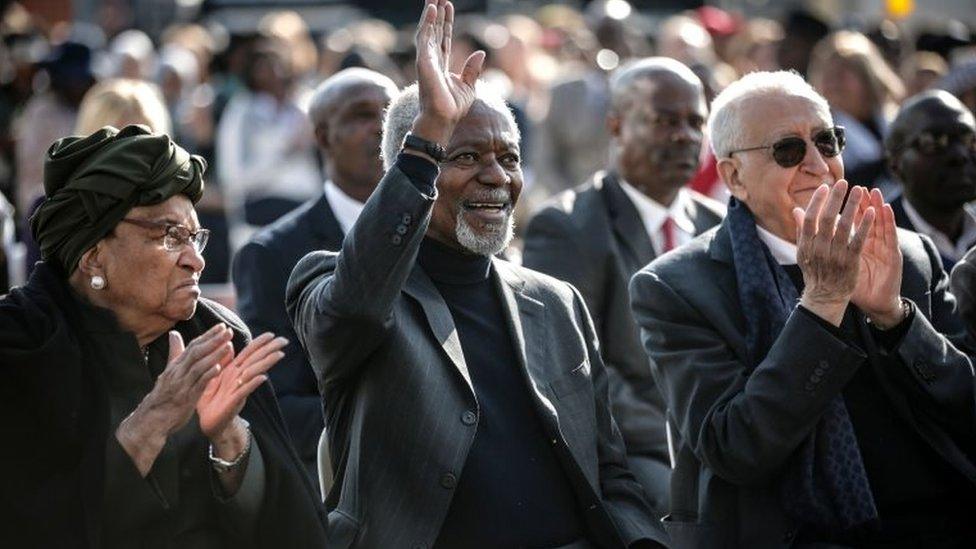
Annan attended an event marking Nelson Mandela's 100th birth anniversary in Johannesburg last month
The same year, he quit his post as UN envoy to Syria after only six months, citing the failures of world powers to fulfil their commitments. He was later quoted as saying: "I lost my troops on the way to Damascus."
His most recent role was chairing an independent commission investigating Myanmar's Rohingya crisis.
Annan's wife, Nane, and three children were "by his side during his last days", the Kofi Annan Foundation said.
- Published18 August 2018
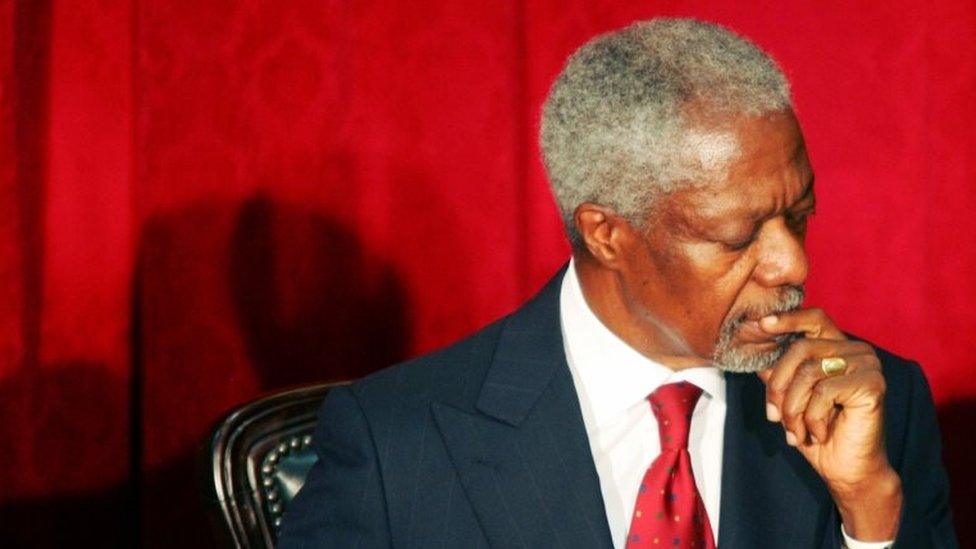
- Published18 August 2018
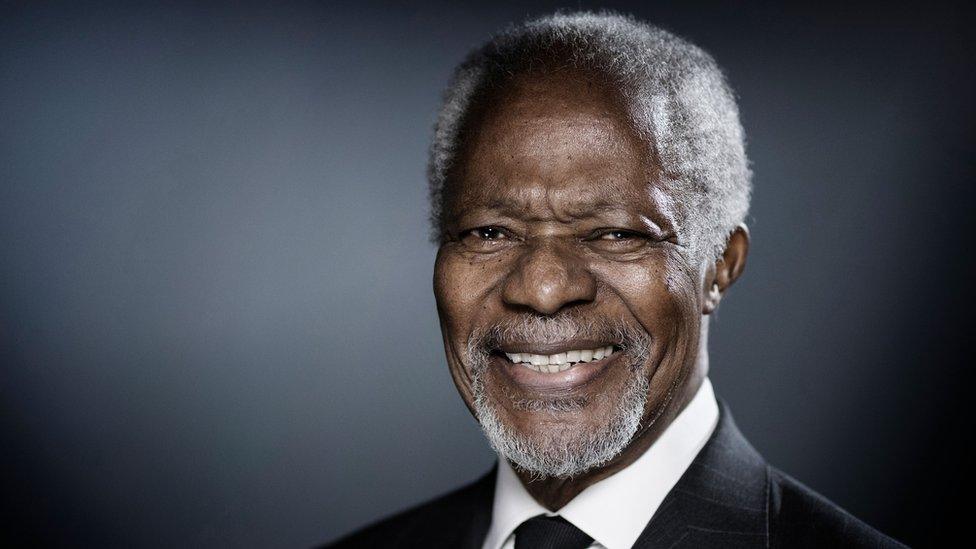
- Published18 April 2018
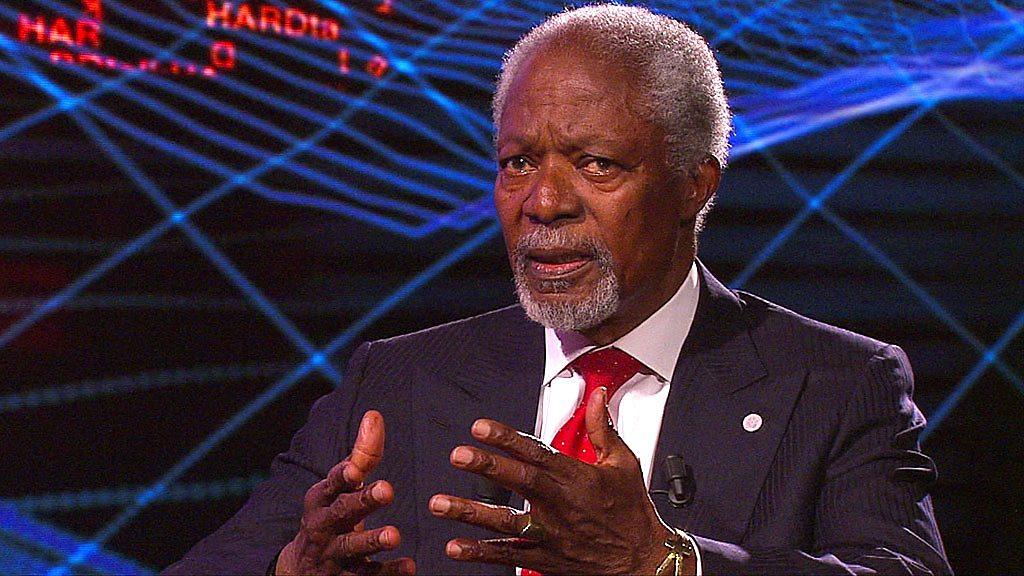
- Published13 April 2018
